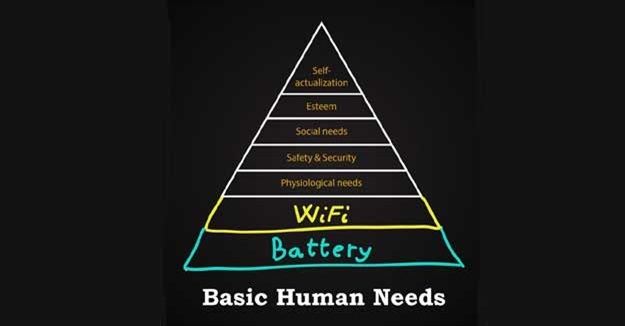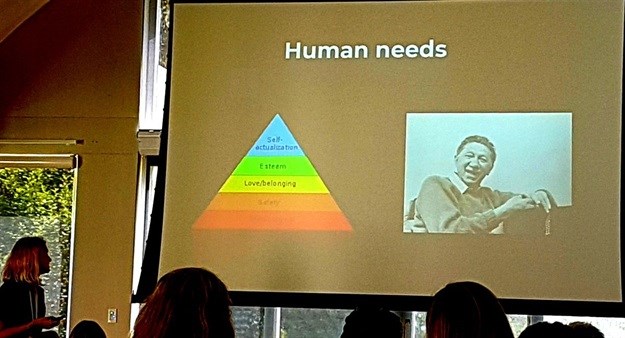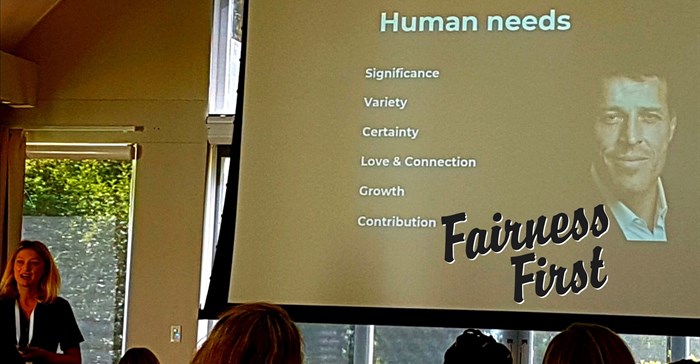#FairnessFirst: How to roll out effective digital transformation

Future Females’ core member Cordula Pfluegl, with a masters’ degree in psychology and new role as head of digital marketing for African Bush Camps, explained at Corinium’s #Women in Digital & Data event why human needs are at the heart of a successful business.
To illustrate this, Pfluegl mentioned that Maslow’s hierarchy of needs has been popular since the 1940s, but the basic pyramid is outdated now, beyond the addition of ‘Wi-Fi’ and 'battery' at the base of the pyramid:
An update by Tony Robbins in 2014 shows what’s now important for a happy life.


Pfluegl spoke through each of these new needs ties in with the growing movement towards digital transformation across all industries.
From Maslow to Robbins: The new human needs
On significance, she said it’s all about customisation and personalisation when dealing with consumers.
In fact, a study shows that 86% of consumers feel a personalised user journey makes a difference.
Pfluegl mentioned Amazon as a leader in this regard, adding that Spotify also does this well, in using the algorithm to predict other music you will like “it feels like they really know you.”
Next is variety.
It’s true that most of us are creatures of habit, but we also love having choice. The success of apps like Uber Eats is a testament to this.
This seeming contradiction ties in with the next level of human need:
On certainty, Pfluegl said we like surprises in our personal lives, but we also need to be able to make predictions and plan ahead.
To illustrate the effectiveness of this in the business realm, Pfluegl spoke of Yoco.
It’s a South African app that launched in 2015 with the idea that many small businesses needed a payment-management system that operates on phone or iPad, because so few consumers carry cash these days, yet payment software often proves too expensive for startups to implement.
Pfluegl says the need for love and connection is a tricky one, as love and tech are constantly moving away from each other.
That’s apart from the likes of improved tech for video calling and apps like Meetup, which link to your other social channels, bringing your connections from the online space to the offline real world.
On the need for personal growth, Pfluegl says this links to the traditional ‘tip’ of Maslow’s human needs: self-actualisation.
She spoke of her after-hours ‘side hustle’ work with Future Females in this regard – started by founders Cerina Bezuidenhout and Lauren Dallas, when they realised that just 2% of VC funding found its way to female-led companies.
Next is contribution: We all want to contribute, but it’s that much sweeter when we are rewarded for making a significant contribution. Pfluegl said that as much as 60% of the ‘connected, caring’ Generation Z prefer to simply tweet and comment online than take action.
That’s where Global Citizen comes in – the app is an excellent example of showing that we all have a role to play and we all need to take action to solve what’s wrong with the world.
The added benefit is that your actions are incentivised, such as with tickets to attend the recent Global Citizen: Mandela 100 concert in Johannesburg.
Pfluegl also mentioned the importance of communicating change, especially when it comes to digital transformation, internally.
Digital transformation does not mean robots will take your job
Answer your employees’ questions and help them understand the importance of digital transformation in your company so they don’t fear ‘robots will take my job’.
Instead of feeling threatened by AI, we need to show how automation helps the humans be more strategic, with the more mundane tasks tackled by machines.
For any attempt at transformation to be successful, Pfluegl says to ensure your team feels significant and heard, and that they will have a chance for growth and contribution as a result. That’s how you do it.
Watch for more coverage of the Corinium Women in Digital and Data conference in my #FairnessFirst columns.











































